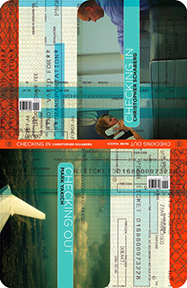I let myself drift into sleep, almost. I lean my head back and allow myself to fall in rhythm with the humming undercurrent of the drone of the engines, or maybe it's the wind rushing past the plane, redirecting its flow as the mass of aluminum and flesh glides forward. The pockets of light, warm chatter of a few pairs of people seems distant, and they feel more like whispers, or a lullaby. In my moment of hypnosis, I see my mind falling backwards through my seat and the fuselage, into night sky. The clouds are like their own city. Life above this city reveals a crimson horizon, one that fades with much more patience and fire than the standard terrestrial sunset. I could remain here forever, suspended in this fresh sky, separate from the world below, protected by the moon and its lunar gleam.
I snap out of this hypnotized state and regain control, now an observer of this vessel’s insides. The man next to me is reading The Brothers Karamazov, while the man next to him has a Kindle. Both are now drowned in their slumbers, seduced by the airplane's siren song that nearly took me. When the pilot's voice mumbles that the time is now for people to use their electronic devices, an urgent and long-awaited rummaging circulates throughout the plane. The sleeping passengers wake up, and rub their eyes in search of a clearer picture of reality.
I'm flying Delta, the airline that provides its passengers with those classic Biscoff cookies, traditionally dipped in coffee. When the flight attendant reaches me I request my usual snack/drink combination: orange juice—from concentrate, no ice—and that good ol' cookie. I decided on these two choices when I started flying regularly between New Orleans and Detroit a couple years ago. I feel a bit slighted and confused when my neighbor—Karamazov—gets a full can of Canada Dry, while I only get a cup of my drink. Because we're flying to Detroit, I would expect Delta to carry Vernors, and I consider it rather criminal that they don't. (Nothing against Canada—I'm on good enough terms with the Habs and I think I speak for most of my native land in saying that we maintain a healthy, open relationship with our neighboring nation.)
I assume that most of the passengers on this flight are landing in Michigan, for Michigan. Yet I'm sure at least twelve people on the plane are using Detroit's international airport (DTW) to connect to another flight, and that their stay will be short. DTW will serve as a pit stop for them, an in-between place that connects them to their final destination. Is DTW even a real place for them? A few, I'm certain, will rush to their next flights, with their wheeled baggage in tow, and won't take a moment to realize where they are, or that they even are somewhere. They won't know that the area they occupy exists and is a portal to a larger, surrounding world, complete with highways and shopping malls and backwoods and historic villages. The same way their portal will connect them to New York or Denver. Those with a few hours between planes might treat it like just another opportunity to accumulate souvenirs such as a Kid Rock album or a John Grisham novel, or settle in at one of the open-faced bars, or connect to the Internet and video chat with their loved ones and tell them how gray the skies are. I am willing to forgive the way they will treat the airport, the place, and I feel a strong connection with my flight mates because of this. I understand they are only trying to get one flight closer to home.
I mix the cookies and orange juice in my mouth and finish my snack with force. I wait for the flight attendant to swing back around and collect my trash. I don't want to leave it—that would be rude. I lean my head back once more, this time with intention—a quick nap before landing—and fall back into the night sky, where the once-crimson horizon is now enveloped in the blue oblivion.
Weldon Ryckman currently lives in New Orleans, but flies to Detroit for holidays. He prefers window seats in the 23rd row.






